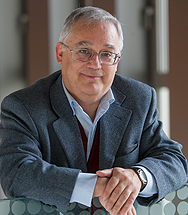Ignacio Arellano: "If we had to give Cervantes an epithet, it would be 'prince of freedom'".
The University closes the International congress 'Cervantes, his work and his time'.

"If one had to give Cervantes an epithet, it would be 'prince of freedom,'" said Ignacio Arellano at the University of Navarra. The director of the group of research Siglo de Oro (GRISO) explained that the literary excellence of this author lies in an obsession that he speaks of in all his texts: "The adventures of Don Quixote are an exercise in freedom, of being able to go anywhere in a mission statement search".
With this reflection he closed the Internationalcongress 'Cervantes, his work and his time. Fourth centenary (1616-2016)', held at the University of Navarra and where more than 80 researchers from 17 countries participated. The meeting was organized by GRISO at partnership with the high school of programs of study Auriseculares (IDEA), and the high school Spanish and Leonés de la language.
Arellano pointed out that a classic is never exhausted because it belongs to its time and, at the same time, to all times. According to the professor, literature consists of a contract between the writer and the reader. Even if the book is the same, the reading part changes constantly so there is always something new to see, to say and to learn. "We read from our perspective, which is different from that of the Romantics, for example. Our official document is to keep active all that Cervantes has offered us," he said.
The validity of the writer as a reference in Hispanic literature also continues in universal culture. The professor recalled that Don Quixote was a best seller at the time and, just two years after the publication of the first part, in Peruvian towns there were already masquerades with the figures of its protagonists. "Cervantes had a very global perspective. The 17th century was a century core topic in the training not only of Spanish culture, but of half the planet. We were one and the same world," he said.
Regarding the coinciding anniversary with Shakespeare, the expert acknowledged that "the center of the empire has changed and Anglo-Saxon culture is dominant, so he is read and known all over the world". However, he clarified, comparisons are meaningless because both figures are unsurpassable.
Finally, the director of GRISO emphasized about the congress International: "It is not an enhancement, nor did Cervantes need it, but a recognition for the benefit of us, who study and enjoy his work". Thus, the group faces the goal to expand its programs of study in Latin America. To this end, together with other American universities, it has created the Sociedad Iberoamericana Siglo de Oro, which will begin to operate next year. "We are developing projects of research, heritage recovery and organization of congresses in emblematic places of our common history," he said.





